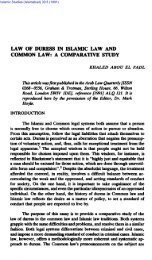MALAY LANGUAGE IN SRI LANKA: SOCIO-MECHANICS OF A ...
MALAY LANGUAGE IN SRI LANKA: SOCIO-MECHANICS OF A ...
MALAY LANGUAGE IN SRI LANKA: SOCIO-MECHANICS OF A ...
Create successful ePaper yourself
Turn your PDF publications into a flip-book with our unique Google optimized e-Paper software.
spoken in Sri Lankan with its distinct Batavian flavour. A well-informed<br />
observer, writing almost sixty years ago, classed the Malay spoken in Sri<br />
Lanka as a Batavian dialect." As the exiles were kept in Sri Lanka in those<br />
areas which the Dutch authorities chose for them, there could not be a<br />
popularization of Malay. But, in the make-shift huton (courts) of royalty<br />
which the exiles 'set-up', educated, cultured, polite, formal Javanese was<br />
spoken and written. Perhaps, they introduced gundul, i.e. Javanese written<br />
in Arabic Gundul survived in Sri Lanka till the mid-forties of this<br />
century, in limited circles and for specified purposes.<br />
Though limited in numbers, the Javanese exiles, with their<br />
background of reference, of classical Arabic and Sanskrit works as well as<br />
'refined' Javanese language, were able to influence the linguistic background<br />
of the small Malay communities in Sri Lanka, mainly around Colombo (then<br />
and now the metropolis of Sri Lanka). Meanwhile, perhaps at a more working<br />
level, the Dutch had introduced into Sri Lanka, levies of Malay (correctly,<br />
Javanese) soldiers. The Dutch used these levies mostly for garrisoning their<br />
forts in Sri Lanka, in such places as Balane, Galadgedara (in the present<br />
Central Province) and Kwegala (in the present North-Central Pr~vince).~~<br />
There are still many Malays living in these areas. Incidentally, the indigenous<br />
princes who ruled central Sri Lanka and who had abrasive relationships with<br />
the Dutch, recruited and maintained Malay soldiery.<br />
Perhaps, an infusion of Malay words into the vocabulary of the Muslims<br />
of Sri Lanka came through by a process set in motion by the Dutch.<br />
That special law called De Bysodim Wmen was a compilation made by<br />
the Dutch of the Islamic law and practices as observed in Java and adjacent<br />
islands. That law was introduced by the Dutch in the Muslim settlements<br />
in Sri Lanka, principally Col~rnbo.~ The range of matters dealt with included<br />
marriage, divorce and intestacy.28 That law envisaged a close administrative<br />
relationship with the Muslim 'priest' (im-m, WrafTb), the headman and the<br />
Dutch officials.<br />
<strong>MALAY</strong> <strong>LANGUAGE</strong> <strong>IN</strong> <strong>SRI</strong> <strong>LANKA</strong> UNDER BRITISH<br />
RULE<br />
When the Dutch authorities capitulated to the British in 1795, the<br />
fate of Malay soldiers was one of the issues. One article of the Terms of<br />
Capitulation said:<br />
The Malay troops should be sent from hence (i.e. Colombo) with<br />
their wives and children to Tuticorin (in India) from thence by easy<br />
marches to Madras; they shall be submitted while they remain prison-
















